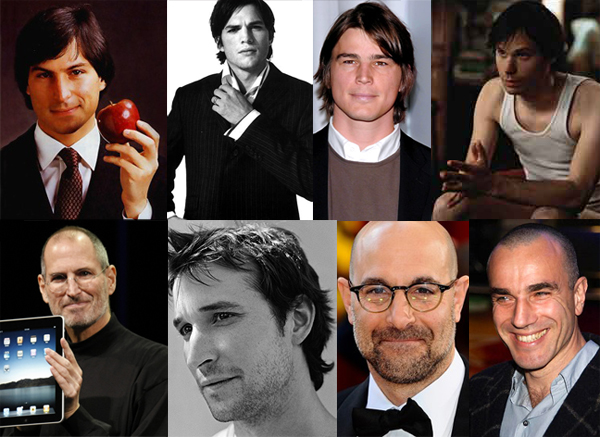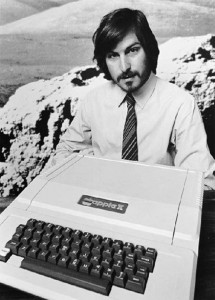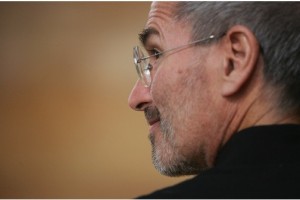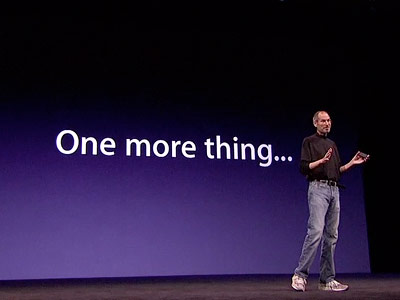
One has to assume a Steve Jobs biopic was inevitable in light of the success of such films as The Social Network and (presently) Moneyball, not to mention the enduring cultural cache of the most famous CEO in the world. It’s even fair to assume that, all other things being equal, the monstrous sales of the official Jobs biography in November may have very well sparked such a project sooner rather than later, regardless of Jobs’ death. But now that Jobs has passed away and sales of the aforementioned biography are definitely going to be monstrous, Sony has made the pre-emptive move of optioning Waltar Issacson’s book for seven-figure cash, ostensibly staking their claim (reported by Deadline). As when Bin Laden was killed and studios all scrambled for scripts until Kathryn Bigelow’s already-in-motion project was fast-tracked, any studio could still strike out with a Jobs biopic. However, when the studio behind The Social Network nabs the rights to a highly publicized, first-ever-official biography it becomes very unlikely that anyone else will bother.
So what happens now?
 Whether they call up Sorkin or bring in another writer, the question is still ultimately going to come down to what story the writers want to tell. The life of Steve Jobs has become a myth of American industrialism, and that’s largely because it’s one of consistent dedication that involves a rise, a fall, a return and ultimately an undeniable vindication. A film could choose to focus on a very narrow part of the Jobs story, or go for the sweeping epic approach. The later would likely be a more worthless, pandering affair as a single film rarely has the bandwidth to set-up and pay-off core themes by hyper-simplifying decades of a person’s complex life. If you narrow the focus though, where do you go? Emulate The Social Network and get in right there at the beginning with the creation of the first Macintosh and push the underdog story of a flawed visionary? Or do you pick up after Apple is a success with Jobs driven out of the company, take things through the NeXT phase, end it as Jobs returns to Apple, then cap it with the introduction of the iPod or iPhone? There are a ton of possibilities, but only so many that will work out.
Whether they call up Sorkin or bring in another writer, the question is still ultimately going to come down to what story the writers want to tell. The life of Steve Jobs has become a myth of American industrialism, and that’s largely because it’s one of consistent dedication that involves a rise, a fall, a return and ultimately an undeniable vindication. A film could choose to focus on a very narrow part of the Jobs story, or go for the sweeping epic approach. The later would likely be a more worthless, pandering affair as a single film rarely has the bandwidth to set-up and pay-off core themes by hyper-simplifying decades of a person’s complex life. If you narrow the focus though, where do you go? Emulate The Social Network and get in right there at the beginning with the creation of the first Macintosh and push the underdog story of a flawed visionary? Or do you pick up after Apple is a success with Jobs driven out of the company, take things through the NeXT phase, end it as Jobs returns to Apple, then cap it with the introduction of the iPod or iPhone? There are a ton of possibilities, but only so many that will work out.
The problem is, what seems like an obvious pairing of studio, intention and materials becomes more complicated when you take a look at the films that are being cited as the reason this makes sense. The Social Network is a big pitfall of a comparison as that script was absolutely ruthless about refashioning the real story around a theme that interested the filmmakers. A symphony of litigious proceedings, hacking, and dorm-room conversations made fascinating by virtue of Fincher’s unique skill set and a very distinctive aesthetic, The Social Network is simply not a model by which other biopics are going to be successfully made. To do so would, at best, leave you with a cheap imitator and more likely a boring, clumsy mess. This would be true of any potential biographic film, even more so for one about another tech pioneer.
If you turn your gaze at Moneyball and the story of Bille Beane, then you quickly see that all the moody photography and Sorkin dialogue you can throw together is not going to result in the same kind of film. As strong as Moneyball is, it’s still on the lighter end of the real-life drama spectrum. Even though the film only looks to tell the story of a team’s single season (as opposed to the years covered by The Social Network), the film still barely manages to keep a handle on the politics, characterization, and statistics that it juggles to tell an entertaining story. It’s also problematic that the film is so much about genuine underdogs that fight their way to… a decent season. The screenplay is required to pull off some serious gymnastics in terms of inflating the importance of single games and broken records. I think Moneyball ultimately pulls that off, but it’s a delicately presented conclusion that ultimately bends the lack of a satisfying pay-off into the emotional payoff. That technique is not something that’s going to work when you’re telling the story of one of the most successful companies on the planet. Beyond that, the weakest aspect of the film is how it handles contrasting the weathered manager Billy Beane with the upstart young player Billy Beane. If the Jobs film tries to fit in the majority of the guy’s life, then such a misstep could prove fatal.
 I think it’s fair to say that there is a very good Steve Jobs biopic to be made, somewhere in the universe among the infinite parallel timelines. Do we currently exist on that timeline? Hard to say. Obviously there’s a whole world of biopics to model a movie after, but hype dictates that any successful Jobs movie will be held up to the light of the two recent biopics from Sony that will have empowered the film, suggesting a fence might be straddled between the story of the visionary upstart and the story of the once-defeated returning underdog. Ultimately I think the only solution will be the involvement of a passionate, skilled filmmaker finding a very specific theme worth exploring, and doing so with a focused story worth telling. There are admittedly some cool possibilites for the film to set itself apart from these others with the period-piece component of the early history of Apple– a well-shot drama set against the backdrop of late 70s computing could be a very entertaining. Or, if the film is going to try and tackle more modern commentary on technology, what about a well-told look at the time a mere few years ago when the possibilities of mobile internet and hyper-connectivity were just starting to surface? The Social Network abstained from toying with those ideas in favor of character study, but maybe a Jobs film won’t.
I think it’s fair to say that there is a very good Steve Jobs biopic to be made, somewhere in the universe among the infinite parallel timelines. Do we currently exist on that timeline? Hard to say. Obviously there’s a whole world of biopics to model a movie after, but hype dictates that any successful Jobs movie will be held up to the light of the two recent biopics from Sony that will have empowered the film, suggesting a fence might be straddled between the story of the visionary upstart and the story of the once-defeated returning underdog. Ultimately I think the only solution will be the involvement of a passionate, skilled filmmaker finding a very specific theme worth exploring, and doing so with a focused story worth telling. There are admittedly some cool possibilites for the film to set itself apart from these others with the period-piece component of the early history of Apple– a well-shot drama set against the backdrop of late 70s computing could be a very entertaining. Or, if the film is going to try and tackle more modern commentary on technology, what about a well-told look at the time a mere few years ago when the possibilities of mobile internet and hyper-connectivity were just starting to surface? The Social Network abstained from toying with those ideas in favor of character study, but maybe a Jobs film won’t.
It will be a while before we have any idea what road the film will travel down, as the book itself has yet to be released. As a collection of interviews from the man himself, competitors, and other people in his life, the Isaacson novel doesn’t sound particularly cinematic at its core, but that’s been said before about books that became great movies. Even once the book comes out the studio will have to hire filmmakers and actually hit the greenlight, while between now and then we’ll have months of casting speculation and debating. You can see up there I’ve already collected a number of oft-referenced candidates for Jobs both as a young man and as an older man, and thats just the start.
Have any thoughts of your own? Be they casting ideas or opinions on how the film should be structured, I’d love to hear what’s running through your brain. I’d try to warn away the dumb Apple fanboys, the melodramatic Jobs cultists, and the “just sayin” Jobs-was-just-a-salesman downplayers, but it’s all invevitable no matter what I say, so have at it…
Twitter
Comment Below
Message Boards
